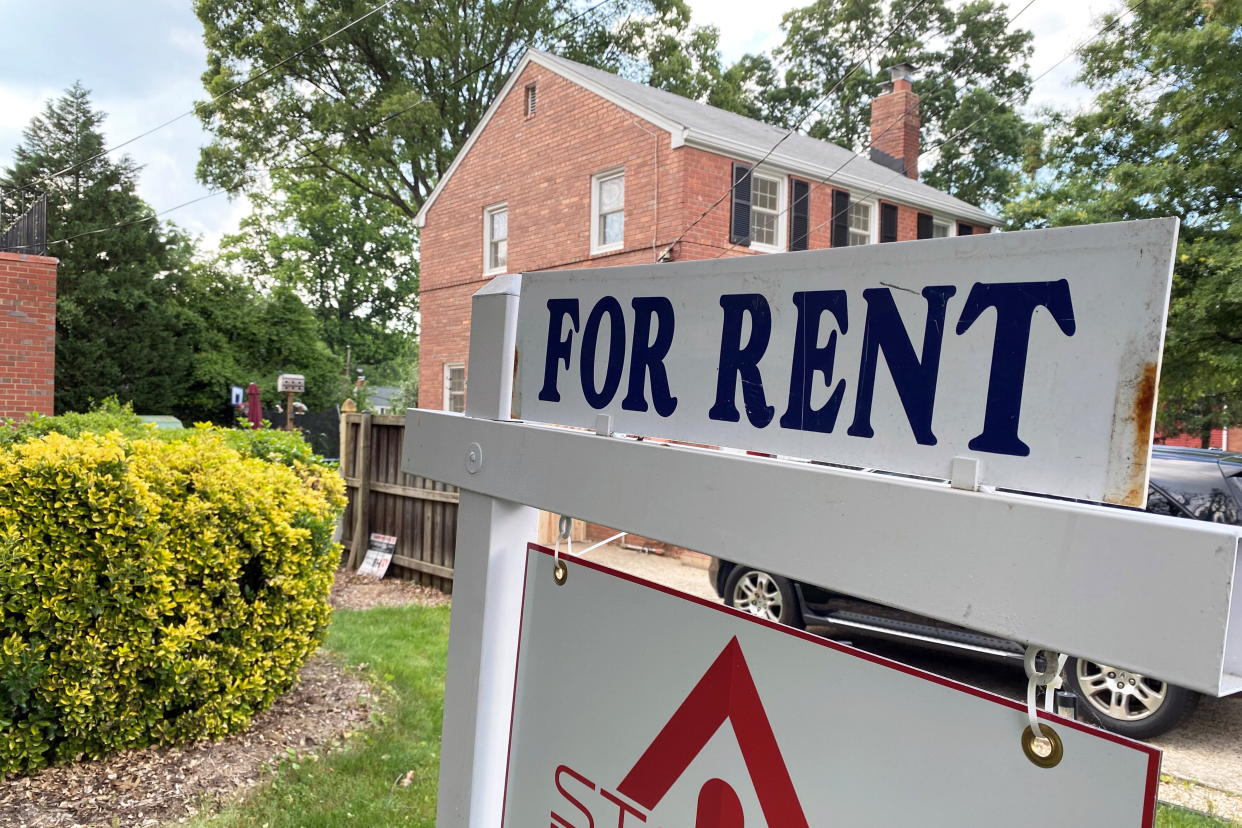What is RealPage — and why is it being blamed for raising everyone's rent?
It’s not every day that an under-the-radar software company draws so much scrutiny. But then there’s RealPage.
The Texas-based company has been sued in Washington, D.C., for a product that, among other things, helps landlords big and small set rents. It has been on the other end of more than 20 class action lawsuits, and more recently, the US Department of Justice (DOJ) has weighed in against it.
The embattled company even drew scrutiny from state representatives and a group of senators including Elizabeth Warren (D-Mass.) Last year the lawmakers implored the DOJ and Federal Trade Commission to step in, saying that RealPage’s rent-setting product could be “driving rapid inflation.”
And just recently, Congressman Dan Goldman urged the New York Attorney General to investigate potential “rent gouging and rental market manipulation” by RealPage.
The DOJ’s intervention comes after the investigative news site ProPublica last year revealed that RealPage’s rent-setting tool used sensitive data provided by landlords and recommended they maximize their profits by pushing higher rents on tenants — which, according to experts, violated federal antitrust laws.
“This is a key step toward holding corporations accountable for their role in fueling the national rent crisis,” Andrea Beaty, research director at Revolving Door Project, a watchdog group that examines corporate America and its relationship with the federal government, told Yahoo Finance.
RealPage and other landlords listed in the lawsuit didn’t immediately respond to requests for comment.
According to housing advocates, rent hikes and other actions by the company have been “devastating” for tenants and underscored the dearth of federal regulation on rent control.
“The rent is the biggest bill that most poor and working-class people in this country are paying each month and our rents are higher today than they've ever been, period,” Tara Raghuveer, director of the Homes Guarantee Campaign at People’s Action, told Yahoo Finance. “The rent is too damn high. And a big part of the reason for that is a complete lack of regulation of the landlords who control the market...and they use tech and tools like RealPage’s software to manufacture the market to benefit their returns.”

The story of RealPage
So what is RealPage and why is everyone so agitated about it?
Founded in 1998 by Steve Winn, RealPage Inc. is a multinational company that offers a variety of technology-based services to real estate owners and property managers, including revenue management products — such as rent-setting. As of 2023, the real estate tech company said it serves over 24 million units worldwide from offices in North America, Europe, and Asia.
But its reach wasn’t always that extensive.
The company’s dominance in the rental market grew after the DOJ’s antitrust division allowed RealPage to acquire its biggest pricing competitor in 2017 — the software firm Lease RentOptions, or LRO, and related assets from The Rainmaker Group for $300 million in cash.
Prior to the merger, RealPage was pricing 1.5 million units at the time, a figure that doubled after the acquisition of LRO, per the investigation by ProPublica. By 2020, the company expanded to 31,700 clients across its products and managed 19.7 million rental units of all types.
Private equity firm Thoma Bravo purchased the public company for $10.2 billion that year, expressing optimism about the platform’s far reach.
“RealPage’s industry leading platform is critical to the real estate ecosystem and has tremendous potential going forward,” Orlando Bravo, managing partner of Thoma Bravo told the press in a statement.
The company’s reach grew further by 2022. According to members of Congress, RealPage helped manage over 19 million of the 48.5 million total rental units in the US as of last year — just under 40% of all rental units in the country.
At the same time, rents climbed steeply across the country. According to RealPage, over the last three years, rents grew by an average of 27%, with some units seeing prices jump by as much as 29.4%.
In 2022, ProPublica’s story also revealed that RealPage’s rent-setting software YieldStar allowed landlords and real estate companies across the US to coordinate and artificially hike rents — in some instances well over 14% within a month.
“Landlords are using any end every tool that’s available to them to increase their profit margins,” Raghuveer said. “We saw that prior to the pandemic, and we’re seeing an even more egregious use of all these types of tools like RealPage YieldStar’s algorithm today more than ever.”
According to a complaint filed by District of Columbia Attorney General Brian Schwalb, RealPage markets three revenue management products: YieldStar, LRO, and AIRM. These products automate pricing for multifamily units by deploying algorithms that use RealPage's data. In other words, to determine a price, the products would employ statistical models— that include proprietary, non-public data from its clients to estimate supply and demand for multifamily units — and would generate a price to maximize the landlord’s revenue.
To subscribe to RealPage’s RM software, landlords were charged an initial set-up fee and then a monthly fee per unit. Additionally, the landlords would “compensate” RealPage by providing valuable proprietary data, AG Schwalb’s lawsuit said. “This has been incredibly lucrative for RealPage, which has earned hundreds of millions in revenue as a result,” the complaint said.
And while landlords don't have to adhere to RealPage’s generated rents, the apartment owners didn't seem to have much choice.
According to AG Schwalb’s statement to the press about the lawsuit, one former RealPage pricing analyst, who was charged with creating reports analyzing clients' compliance rates, stated that if a client failed to impose RealPage’s rents at least 75% of the time, landlords would be expelled from the “district-wide housing cartel.”

Apparently many landlords and real estate companies gladly jumped on board.
For instance, in the District of Columbia, well over 30% of apartments in multifamily buildings (buildings with five or more units) and approximately 60% of units in larger multifamily buildings (50+ units) are priced using RealPage’s software, according to the attorney general. The figure was much higher in the metro area that includes Washington and Alexandria, where 90% of units in larger buildings were priced with RealPage’s software.
Some 14 of the largest residential landlords were named in AG Schwalb’s lawsuit — including Bozzuto Management Company, Greystar, and William C. Smith & Co.
The complaint filed by AG Schwalb on Nov. 1, said the accused landlords in D.C. agreed to “delegate their price-setting authority to RealPage, rather than competing on price.” Landlords agreed, in writing, to share competitively sensitive data for RealPage to “feed into its rent-setting RM software.”
Weeks after AG Schwalb filed his lawsuit, Congressman Dan Goldman wrote a letter to New York Attorney General Letitia James, urging her office to investigate RealPage and a number of New York’s biggest landlords who could be potential benefactors of “possible anticompetitive price-fixing.”
Goldman also called on AG James to investigate property management firm Greystar, which manages more than 857,400 multifamily units and student beds globally and has been named in other related lawsuits. (Greystar did not comment.)
On other legal fronts, earlier this spring, more than 20 of the lawsuits against RealPage were consolidated in federal court in Nashville. The court filing also informed the US Judicial Panel of Multidistrict Litigation of 12 related actions pending in seven districts that RealPage is facing for allegedly inflating the prices in student housing.

Federal troubles
The US Justice Department moved to support tenants in the rent-setting class-action lawsuit against RealPage in November. Justice Department antitrust lawyers filed a statement of interest in Nashville federal court against RealPage, just weeks after D.C. Attorney General Schwalb filed his complaint.
According to the latest filing from the DOJ, prosecutors will be investigating whether RealPage and subscribing landlords did in fact violate the Sherman Act, by “knowingly combining their sensitive, nonpublic pricing and supply information in an algorithm” to make price decisions, with the knowledge and expectation that other competitors would do the same.
“Algorithms are the new frontier,” DOJ antitrust lawyers said in their filing. “Given the amount of information an algorithm can access and digest, this new frontier poses an even greater anticompetitive threat than the last.”
As for RealPage, the company's lawyers, in response to the DOJ's statement of interest, said that the DOJ's court filing was inaccurate, having misstated the tenants' allegations. “The court should reject this,” the response said. “It reflects an attempt to expand the Sherman Act beyond the boundaries of well-established and controlling antitrust jurisprudence.”
Additionally, RealPage noted that the DOJ ignored that some landlords “had low acceptance of RealPage’s pricing recommendations.” In other words, they made their own “pricing decisions.”
As for the next steps, the case of District of Columbia v. RealPage Inc. et al in the Superior Court of the District of Columbia is unassigned. The nearly two dozen suits consolidated in Nashville federal court have been assigned to Chief Judge Waverly Crenshaw in the Middle District of Tennessee.
And in New York, AG Letitia James has yet to respond to Congressman Dan Goldman's request for her office to take aim at RealPage.
"These landlords, these corporations they exist across state lines," Raghuveer told Yahoo Finance. "I'm sure they're colluding and sort of price setting across state lines, so we need...tenant protections that protect tenants against these egregious rent hikes, no matter where they live."
Gabriella is a personal finance and housing reporter at Yahoo Finance. Follow her on Twitter @__gabriellacruz.
